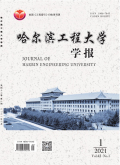哈尔滨工程大学学报2024,Vol.45Issue(3):459-465,7.DOI:10.11990/jheu.202206074
基于航迹规划的无人机地形辅助导航
Path planning-based terrain contour matching navigation of unmanned aerial vehicles
摘要
Abstract
A terrain-aided navigation method based on track planning is proposed in this paper to improve the poor adaptability and real-time performance of unmanned aerial vehicle(UAV)terrain-aided navigation based on terrain contour matching.To solve the problem of terrain matching being highly dependent on terrain,the area that UAVs must approach is divided into blocks,and the terrain standard deviation of each block is calculated.The flat terrain area and the terrain undulating area are then selected based on the terrain standard deviation,while the flight track planning algorithm is used to plan the route for UAV in the area with large terrain undulating.The idea of distribu-tion estimation is introduced on the basis of the particle swarm optimization(PSO)algorithm with the aim of ad-dressing the time-consuming problem of traditional traversal search elevation matching algorithms.This proposed so-lution can form the optimized PSO algorithm for terrain contour matching and enhance global optimization ability.The simulation results show that the optimized PSO reduced the matching time by 2/3.Furthermore,the terrain-ai-ded navigation based on track planning improved matching accuracy by 6/7.关键词
地形辅助导航/航迹规划/优化粒子群算法/地形轮廓匹配/地形适应性/群智能算法/A*算法/实时性Key words
terrain aided navigation/track planning/optimized particle swarm optimization/terrain contour matc-hing/terrain adaptability/swarm intelligence algorithm/A* alogrithm/real-time capability分类
航空航天引用本文复制引用
张睿,李万睿,肖勇,杨林,许斌..基于航迹规划的无人机地形辅助导航[J].哈尔滨工程大学学报,2024,45(3):459-465,7.基金项目
国家自然科学基金项目(61933010) (61933010)
江苏省卓越博士后计划项目(2022ZB117) (2022ZB117)
航空科学基金项目(201905018002,201905018003). (201905018002,201905018003)

